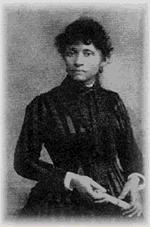

|
1886, May 4: The Haymarket Tragedy On May 3, 1886, violence erupted at the McCormick Reaper Works during an assembly of strikers. That evening a small group of anarchists met to plan a rally the next day in response to the McCormick incident. The rally began about 8:30 p.m. May 4 at the Haymarket, a site on Randolph between Halsted and Des Plaines Street, but due to low attendance it was moved a half block away to Des Plaines Street north of Randolph Street. After 10 p.m., as the rally drew to a close, 176 policemen led by Inspector John Bonfield moved in demanding immediate dispersal of the remaining 200 workers. Suddenly a bomb exploded. In the chaos that followed shots were fired by police and perhaps by workers. One police officer was killed by the bomb, six officers died later and sixty others were injured. No official count was made of civilian deaths or injuries probably because friends and/or relatives carried them off immediately. Medical evidence later showed that most of the injuries suffered by the police were caused by their own bullets. All well known anarchists and socialists were rounded up and arrested in the days following the riot. Thirty one of them were named in criminal indictments and eight held for trial. Although the bomb thrower has never been identified the eight indicted men were convicted by a court which held that the "inflammatory speeches and publications" of these eight incited the actions of the mob. The Illinois and U.S. Supreme Courts upheld the verdict. On November 11, 1887 four of the accused were hanged. One committed suicide in jail, two had their sentences commuted to life in prison and one remained in prison even though there was no case against him. After John P. Altgeld became Governor in 1893, the petitions for pardon that had been presented to and refused by his predecessor Richard Oglesby, were again introduced. After a careful review of the case Altgeld granted a full pardon on June 26, 1893. In his remarks he claimed the jury was selected to convict and the judge so prejudiced against the defendants that a fair trial was impossible. Two Chicago area monuments were erected to commemorate the Haymarket Riot. One stands in German Waldheim Cemetery (Forest Park, IL). It depicts Justice preparing to draw a sword while placing a laurel wreath on the brow of a fallen worker. At the base of the monument are the final words August Spies spoke before his execution: "The day will come when our silence will be more powerful than the voices you are throttling today." The monument was dedicated on June 25, 1893, before a crowd of 8,000. "In the name of the people I command peace" reads the inscription below the police officer depicted on the second monument. Since its dedication in 1889 peace has been somewhat elusive. The monument was originally situated in the middle of Haymarket Square, where street car lines were forced to swerve around it. On May 24, 1890 an attempt was made to blow it up. In 1900 the monument was regarded as a traffic hazard and moved to Union Park at Randolph and Ogden Ave. On May 4, 1903 the city seal and state crest were stolen from its base. A disgruntled streetcar driver ran his vehicle into it, knocking it off its base on May 4, 1927, claiming he was tired of seeing it. On May 4, 1928, after repairs were completed, it was moved further into Union Park. The statue was again moved on May 4, 1958 and placed at Randolph St. at the Kennedy Expressway, 200 feet from its original location. The Chicago City Council granted the monument landmark status on May 4, 1965. In October, 1969 a dynamite bomb exploded at the feet of the figure damaging it from the calves down. In November black printers ink was tossed on it, doing further damage. Another bomb was exploded there in October 1970. After each incident the monument was restored, but after the 1970 incident Mayor Richard J. Daley placed a round-the-clock police guard at the site. When this proved too costly, the statue was moved to Police Headquarters at 11th and State Street in 1972. In October, 1976 the monument was again moved. It was rededicated at the Police Academy and can only be seen by making arrangements in advance. Peace. Source: |